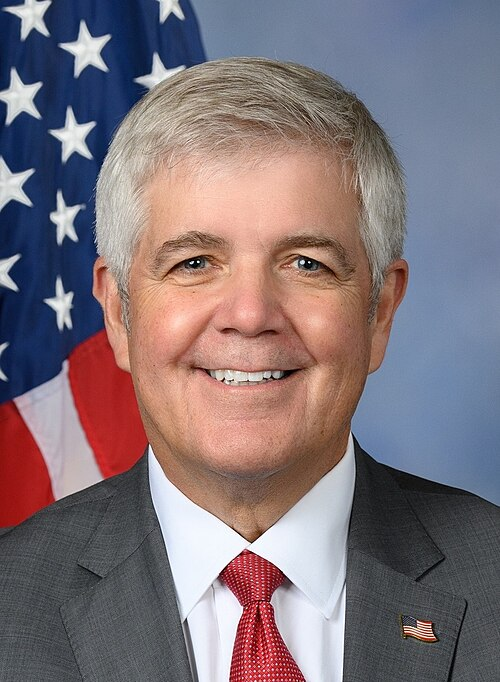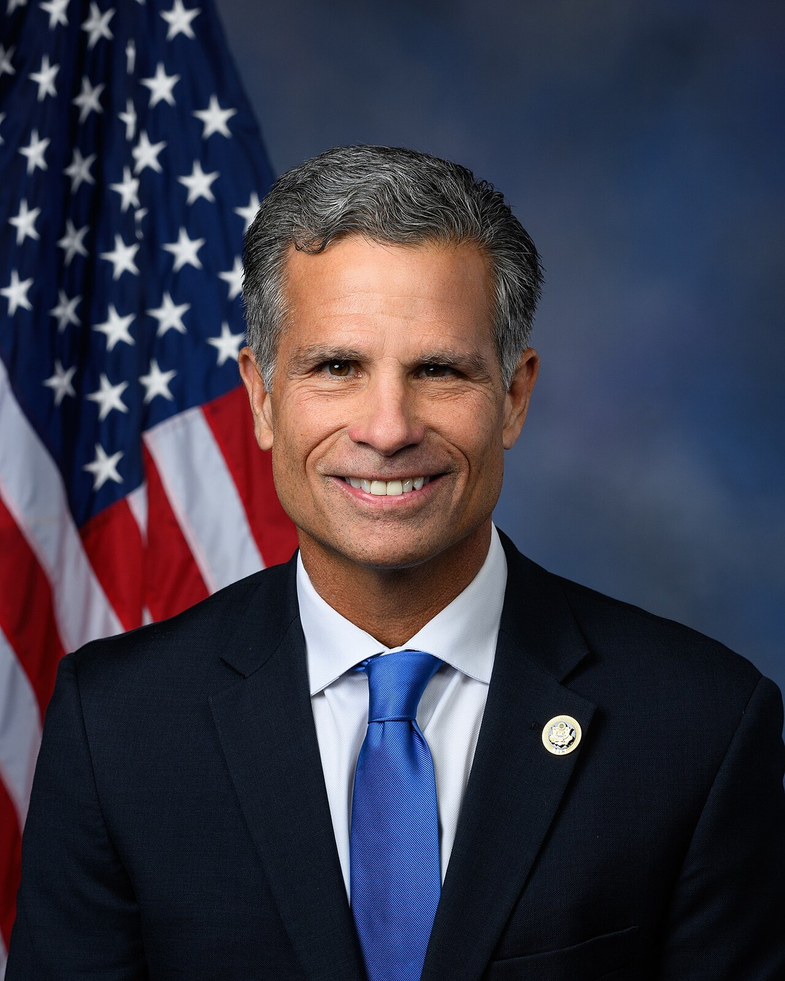|
David Taylor
R / House
|
AMGN
AMGEN INC. - COMMON STOCK
|
Sale
$1,001 - $15,000
|
Dec 05, 2025
|
Dec 03, 2025
|
-7.71%
|
|
David Taylor
R / House
|
AMGN
AMGEN INC. - COMMON STOCK
|
Sale
$1,001 - $15,000
|
Dec 05, 2025
|
Dec 03, 2025
|
-7.71%
|
|
Ro Khanna
D / House
|
AMZN
AMAZON.COM INC CMN
|
Sale
$1,001 - $15,000
|
Dec 08, 2025
|
Nov 20, 2025
|
-0.32%
|
|
Ro Khanna
D / House
|
AMZN
DC AMAZON.COM INC CMN
|
Sale
$1,001 - $15,000
|
Dec 08, 2025
|
Nov 20, 2025
|
-0.32%
|
|
Gilbert Ray Cisneros, Jr.
D / House
|
AMZN
AMAZON.COM, INC. - COMMON STOCK
|
Purchase
$1,001 - $15,000
|
Dec 15, 2025
|
Nov 18, 2025
|
-3.13%
|
|
Gilbert Ray Cisneros, Jr.
D / House
|
AMZN
AMAZON.COM, INC. - COMMON STOCK
|
Purchase
$15,001 - $50,000
|
Dec 15, 2025
|
Nov 18, 2025
|
-3.13%
|
|
John Boozman
R / Senate
|
AMZN
Amazon.com Inc
|
Purchase
$1,001 - $15,000
|
Dec 08, 2025
|
Nov 13, 2025
|
-6.23%
|
|
Gilbert Ray Cisneros, Jr.
D / House
|
BA
BOEING COMPANY
|
Sale
$1,001 - $15,000
|
Dec 15, 2025
|
Nov 12, 2025
|
+5.47%
|
|
Lisa C. McClain
R / House
|
ILMN
ILLUMINA, INC. - COMMON STOCK
|
Sale
$1,001 - $15,000
|
Nov 21, 2025
|
Oct 31, 2025
|
+9.20%
|
|
Lisa C. McClain
R / House
|
ILMN
ILLUMINA, INC. - COMMON STOCK
|
Sale
$1,001 - $15,000
|
Nov 21, 2025
|
Oct 30, 2025
|
+35.96%
|
|
Lisa C. McClain
R / House
|
ILMN
ILLUMINA, INC. - COMMON STOCK
|
Purchase
$1,001 - $15,000
|
Nov 21, 2025
|
Oct 30, 2025
|
+35.96%
|
|
Michael T. McCaul
R / House
|
AMZN
AMAZON.COM INC
|
Sale
$1,001 - $15,000
|
Nov 10, 2025
|
Oct 27, 2025
|
+0.15%
|
|
Michael T. McCaul
R / House
|
AMZN
AMAZON COM INC COM
|
Sale
$50,001 - $100,000
|
Nov 10, 2025
|
Oct 27, 2025
|
+0.15%
|
|
Marjorie Taylor Greene
R / House
|
AMGN
AMGEN INC. - COMMON STOCK
|
Purchase
$1,001 - $15,000
|
Oct 28, 2025
|
Oct 24, 2025
|
+8.21%
|
|
Marjorie Taylor Greene
R / House
|
AMZN
AMAZON.COM, INC. - COMMON STOCK
|
Purchase
$1,001 - $15,000
|
Oct 28, 2025
|
Oct 24, 2025
|
+0.19%
|
|
Gilbert Ray Cisneros, Jr.
D / House
|
AMZN
AMAZON.COM, INC. - COMMON STOCK
|
Purchase
$1,001 - $15,000
|
Nov 18, 2025
|
Oct 17, 2025
|
+3.53%
|
|
Ro Khanna
D / House
|
AMZN
AMAZON.COM INC CMN
|
Purchase
$1,001 - $15,000
|
Nov 06, 2025
|
Oct 17, 2025
|
+3.53%
|
|
Marjorie Taylor Greene
R / House
|
AMZN
AMAZON.COM, INC. - COMMON STOCK
|
Purchase
$1,001 - $15,000
|
Oct 20, 2025
|
Oct 15, 2025
|
+2.40%
|
|
Lisa C. McClain
R / House
|
AMZN
AMAZON.COM, INC. - COMMON STOCK
|
Sale
$1,001 - $15,000
|
Nov 21, 2025
|
Oct 14, 2025
|
+1.55%
|
|
Marjorie Taylor Greene
R / House
|
AMZN
AMAZON.COM, INC. - COMMON STOCK
|
Purchase
$1,001 - $15,000
|
Oct 20, 2025
|
Oct 09, 2025
|
-2.26%
|
|
Ro Khanna
D / House
|
AMGN
AMGEN INC. CMN
|
Sale
$1,001 - $15,000
|
Oct 03, 2025
|
Sep 29, 2025
|
+13.23%
|
|
Lisa C. McClain
R / House
|
AMGN
AMGEN INC. - COMMON STOCK
|
Sale
$1,001 - $15,000
|
Oct 22, 2025
|
Sep 25, 2025
|
+13.83%
|
|
Michael T. McCaul
R / House
|
AMZN
AMAZON COM INC COM
|
Sale
$1,001 - $15,000
|
Oct 10, 2025
|
Sep 25, 2025
|
+0.34%
|
|
Ro Khanna
D / House
|
AMZN
AMAZON.COM INC CMN
|
Sale
$1,001 - $15,000
|
Oct 03, 2025
|
Sep 25, 2025
|
+0.34%
|
|
Lisa C. McClain
R / House
|
AMZN
AMAZON.COM, INC. - COMMON STOCK
|
Sale
$1,001 - $15,000
|
Oct 22, 2025
|
Sep 25, 2025
|
+0.34%
|
|
Val T. Hoyle
D / House
|
AMZN
AMAZON.COM, INC. - COMMON STOCK
|
Sale
$15,001 - $50,000
|
Oct 10, 2025
|
Sep 23, 2025
|
-0.02%
|
|
Val T. Hoyle
D / House
|
BA
BOEING COMPANY
|
Sale
$1,001 - $15,000
|
Oct 10, 2025
|
Sep 23, 2025
|
-8.04%
|
|
Ro Khanna
D / House
|
AMZN
AMAZON.COM INC CMN
|
Purchase
$1,001 - $15,000
|
Oct 03, 2025
|
Sep 19, 2025
|
-4.75%
|
|
Cleo Fields
D / House
|
AMZN
AMAZON.COM, INC. - COMMON STOCK
|
Purchase
$15,001 - $50,000
|
Sep 30, 2025
|
Sep 17, 2025
|
-5.77%
|
|
Marjorie Taylor Greene
R / House
|
AMGN
AMGEN INC. - COMMON STOCK
|
Purchase
$1,001 - $15,000
|
Sep 27, 2025
|
Sep 11, 2025
|
+8.69%
|
|
Lisa C. McClain
R / House
|
AMZN
AMAZON.COM, INC. - COMMON STOCK
|
Purchase
$1,001 - $15,000
|
Oct 22, 2025
|
Sep 11, 2025
|
-5.32%
|
|
Cleo Fields
D / House
|
AMZN
AMAZON.COM, INC. - COMMON STOCK
|
Purchase
$50,001 - $100,000
|
Sep 30, 2025
|
Sep 10, 2025
|
-6.33%
|
|
Val T. Hoyle
D / House
|
AMZN
AMAZON.COM, INC. - COMMON STOCK
|
Purchase
$1,001 - $15,000
|
Oct 10, 2025
|
Sep 10, 2025
|
-6.33%
|
|
Ro Khanna
D / House
|
AMZN
AMAZON.COM INC CMN
|
Sale
$1,001 - $15,000
|
Oct 03, 2025
|
Sep 05, 2025
|
-8.01%
|
|
Sheldon Whitehouse
D / Senate
|
AMGN
Amgen Inc
|
Sale (Full)
$1,001 - $15,000
|
Oct 03, 2025
|
Sep 04, 2025
|
+8.36%
|
|
Cleo Fields
D / House
|
AMZN
AMAZON.COM, INC. - COMMON STOCK
|
Purchase
$100,001 - $250,000
|
Sep 30, 2025
|
Sep 03, 2025
|
-5.85%
|
|
Michael T. McCaul
R / House
|
AMZN
AMAZON COM INC COM
|
Sale
$50,001 - $100,000
|
Sep 11, 2025
|
Aug 21, 2025
|
-5.38%
|
|
Michael T. McCaul
R / House
|
AMZN
AMAZON COM INC COM
|
Sale
$50,001 - $100,000
|
Sep 11, 2025
|
Aug 21, 2025
|
-5.38%
|
|
Ro Khanna
D / House
|
AMZN
AMAZON.COM INC CMN
|
Purchase
$1,001 - $15,000
|
Sep 09, 2025
|
Aug 19, 2025
|
-7.39%
|
|
Ro Khanna
D / House
|
AMZN
AMAZON.COM INC CMN
|
Purchase
$1,001 - $15,000
|
Sep 09, 2025
|
Aug 19, 2025
|
-7.39%
|
|
Cleo Fields
D / House
|
AMZN
AMAZON.COM, INC. - COMMON STOCK
|
Purchase
$50,001 - $100,000
|
Sep 03, 2025
|
Aug 15, 2025
|
-8.06%
|
|
Cleo Fields
D / House
|
AMZN
AMAZON.COM, INC. - COMMON STOCK
|
Purchase
$15,001 - $50,000
|
Sep 03, 2025
|
Aug 15, 2025
|
-8.06%
|
|
Lisa C. McClain
R / House
|
AMZN
AMAZON.COM, INC. - COMMON STOCK
|
Sale
$1,001 - $15,000
|
Aug 13, 2025
|
Aug 04, 2025
|
-1.19%
|
|
Ro Khanna
D / House
|
AMZN
AMAZON.COM INC CMN
|
Purchase
$1,001 - $15,000
|
Sep 09, 2025
|
Aug 04, 2025
|
-1.19%
|
|
Ro Khanna
D / House
|
AMZN
AMAZON.COM INC CMN
|
Purchase
$1,001 - $15,000
|
Sep 09, 2025
|
Aug 04, 2025
|
-1.19%
|
|
Cleo Fields
D / House
|
AMZN
AMAZON.COM, INC. - COMMON STOCK
|
Purchase
$100,001 - $250,000
|
Sep 03, 2025
|
Aug 01, 2025
|
-4.37%
|
|
Cleo Fields
D / House
|
AMZN
AMAZON.COM, INC. - COMMON STOCK
|
Purchase
$100,001 - $250,000
|
Aug 06, 2025
|
Jul 29, 2025
|
-9.44%
|
|
Lisa C. McClain
R / House
|
AMZN
AMAZON.COM, INC. - COMMON STOCK
|
Sale
$1,001 - $15,000
|
Aug 13, 2025
|
Jul 22, 2025
|
-9.03%
|
|
Cleo Fields
D / House
|
AMZN
AMAZON.COM, INC. - COMMON STOCK
|
Purchase
$100,001 - $250,000
|
Aug 06, 2025
|
Jul 16, 2025
|
-7.92%
|
|
Cleo Fields
D / House
|
AMZN
AMAZON.COM, INC. - COMMON STOCK
|
Purchase
$1,001 - $15,000
|
Aug 06, 2025
|
Jul 14, 2025
|
-8.92%
|
|
Michael T. McCaul
R / House
|
AMZN
AMAZON COM INC COM
|
Sale
$15,001 - $50,000
|
Aug 12, 2025
|
Jul 11, 2025
|
-8.84%
|
|
Michael T. McCaul
R / House
|
AMZN
AMAZON COM INC COM
|
Sale
$15,001 - $50,000
|
Aug 13, 2025
|
Jul 11, 2025
|
-8.84%
|
|
Val T. Hoyle
D / House
|
AMZN
AMAZON.COM, INC. - COMMON STOCK
|
Purchase
$1,001 - $15,000
|
Sep 12, 2025
|
Jul 02, 2025
|
-7.07%
|
|
Cleo Fields
D / House
|
AMZN
AMAZON.COM, INC. - COMMON STOCK
|
Purchase
$100,001 - $250,000
|
Jul 01, 2025
|
Jun 30, 2025
|
-7.26%
|
|
Michael T. McCaul
R / House
|
AMZN
AMAZON COM INC COM
|
Sale
$250,001 - $500,000
|
Jul 07, 2025
|
Jun 27, 2025
|
-9.27%
|
|
Cleo Fields
D / House
|
AMZN
AMAZON.COM, INC. - COMMON STOCK
|
Purchase
$100,001 - $250,000
|
Jul 01, 2025
|
Jun 25, 2025
|
-5.30%
|
|
Cleo Fields
D / House
|
AMZN
AMAZON.COM, INC. - COMMON STOCK
|
Purchase
$100,001 - $250,000
|
Jul 01, 2025
|
Jun 25, 2025
|
-5.30%
|
|
Cleo Fields
D / House
|
AMZN
AMAZON.COM, INC. - COMMON STOCK
|
Purchase
$100,001 - $250,000
|
Jul 01, 2025
|
Jun 25, 2025
|
-5.30%
|
|
Lisa C. McClain
R / House
|
AMGN
AMGEN INC. - COMMON STOCK
|
Purchase
$1,001 - $15,000
|
Aug 13, 2025
|
Jun 24, 2025
|
+2.45%
|
|
Robert Bresnahan
R / House
|
AMZN
AMAZON.COM, INC. - COMMON STOCK
|
Sale
$1,001 - $15,000
|
Jul 08, 2025
|
Jun 23, 2025
|
-4.78%
|
|
Lisa C. McClain
R / House
|
AMZN
AMAZON.COM, INC. - COMMON STOCK
|
Purchase
$1,001 - $15,000
|
Aug 13, 2025
|
Jun 17, 2025
|
-8.82%
|
|
Michael T. McCaul
R / House
|
AMZN
AMAZON.COM INC
|
Sale
$15,001 - $50,000
|
Jul 07, 2025
|
Jun 16, 2025
|
-8.47%
|
|
Michael T. McCaul
R / House
|
AMZN
AMAZON COM INC COM
|
Sale
$100,001 - $250,000
|
Jul 07, 2025
|
Jun 16, 2025
|
-8.47%
|
|
Cleo Fields
D / House
|
AMZN
AMAZON.COM, INC. - COMMON STOCK
|
Purchase
$100,001 - $250,000
|
Jul 01, 2025
|
Jun 09, 2025
|
-9.47%
|
|
Lisa C. McClain
R / House
|
ILMN
ILLUMINA, INC. - COMMON STOCK
|
Purchase
$1,001 - $15,000
|
Aug 13, 2025
|
Jun 09, 2025
|
+44.99%
|
|
Cleo Fields
D / House
|
AMZN
AMAZON.COM, INC. - COMMON STOCK
|
Purchase
$50,001 - $100,000
|
Jul 01, 2025
|
Jun 09, 2025
|
-9.47%
|
|
Lisa C. McClain
R / House
|
AMZN
AMAZON.COM, INC. - COMMON STOCK
|
Purchase
$1,001 - $15,000
|
Aug 13, 2025
|
Jun 09, 2025
|
-9.47%
|
|
Ro Khanna
D / House
|
AMZN
AMAZON.COM INC CMN
|
Purchase
$1,001 - $15,000
|
Jul 09, 2025
|
Jun 06, 2025
|
-7.93%
|
|
Cliff Bentz
R / House
|
AMGN
AMGEN INC. - COMMON STOCK
|
Purchase
$1,001 - $15,000
|
Jul 09, 2025
|
Jun 06, 2025
|
-4.40%
|
|
Val T. Hoyle
D / House
|
AMZN
AMAZON.COM, INC. - COMMON STOCK
|
Purchase
$1,001 - $15,000
|
Sep 12, 2025
|
Jun 06, 2025
|
-7.93%
|
|
Cleo Fields
D / House
|
AMZN
AMAZON.COM, INC. - COMMON STOCK
|
Purchase
$100,001 - $250,000
|
Jul 01, 2025
|
Jun 05, 2025
|
-6.21%
|
|
Gilbert Ray Cisneros, Jr.
D / House
|
BA
BOEING COMPANY
|
Purchase
$1,001 - $15,000
|
Jun 06, 2025
|
May 30, 2025
|
-17.13%
|
|
Ro Khanna
D / House
|
AMZN
AMAZON.COM INC CMN
|
Purchase
$1,001 - $15,000
|
Jun 10, 2025
|
May 28, 2025
|
-5.55%
|
|
Ro Khanna
D / House
|
AMZN
AMAZON.COM INC CMN
|
Purchase
$1,001 - $15,000
|
Jun 10, 2025
|
May 19, 2025
|
-4.92%
|
|
John Boozman
R / Senate
|
AMZN
Amazon.com Inc
|
Purchase
$1,001 - $15,000
|
Jun 14, 2025
|
May 16, 2025
|
-4.74%
|
|
Marjorie Taylor Greene
R / House
|
AMGN
AMGEN INC. - COMMON STOCK
|
Purchase
$1,001 - $15,000
|
May 19, 2025
|
May 14, 2025
|
+5.08%
|
|
Jefferson Shreve
R / House
|
AMZN
AMAZON.COM, INC. - COMMON STOCK
|
Sale
$250,001 - $500,000
|
Jun 22, 2025
|
May 12, 2025
|
-8.56%
|
|
Jefferson Shreve
R / House
|
AMGN
AMGEN INC. - COMMON STOCK
|
Sale
$15,001 - $50,000
|
Jun 22, 2025
|
May 12, 2025
|
-1.33%
|
|
Jefferson Shreve
R / House
|
BA
BOEING COMPANY
|
Sale
$50,001 - $100,000
|
Jun 22, 2025
|
May 12, 2025
|
-14.02%
|
|
Thomas H. Kean, Jr.
R / House
|
AMZN
AMAZON.COM, INC. - COMMON STOCK
|
Purchase
$1,001 - $15,000
|
Jun 17, 2025
|
May 08, 2025
|
-2.95%
|
|
Marjorie Taylor Greene
R / House
|
BA
BOEING COMPANY
|
Purchase
$1,001 - $15,000
|
May 06, 2025
|
May 05, 2025
|
-11.41%
|
|
Marjorie Taylor Greene
R / House
|
AMGN
AMGEN INC. - COMMON STOCK
|
Purchase
$1,001 - $15,000
|
May 06, 2025
|
May 05, 2025
|
-7.57%
|
|
Marjorie Taylor Greene
R / House
|
AMZN
AMAZON.COM, INC. - COMMON STOCK
|
Purchase
$1,001 - $15,000
|
May 06, 2025
|
May 05, 2025
|
+0.36%
|
|
Gilbert Ray Cisneros, Jr.
D / House
|
AMZN
AMAZON.COM, INC. - COMMON STOCK
|
Sale
$1,001 - $15,000
|
May 06, 2025
|
Apr 29, 2025
|
-2.33%
|
|
Thomas H. Kean, Jr.
R / House
|
AMZN
AMAZON.COM, INC. - COMMON STOCK
|
Purchase
$1,001 - $15,000
|
May 15, 2025
|
Apr 24, 2025
|
-3.52%
|
|
Ro Khanna
D / House
|
AMZN
AMAZON.COM INC CMN
|
Sale
$1,001 - $15,000
|
May 12, 2025
|
Apr 23, 2025
|
-2.15%
|
|
Jonathan L. Jackson
D / House
|
AMZN
AMAZON.COM, INC. - COMMON STOCK
|
Purchase
$1,001 - $15,000
|
Aug 25, 2025
|
Apr 23, 2025
|
-2.15%
|
|
Bruce Westerman
R / House
|
BA
BOEING COMPANY
|
Sale
$1,001 - $15,000
|
May 12, 2025
|
Apr 21, 2025
|
-4.44%
|
|
Bruce Westerman
R / House
|
AMZN
AMAZON.COM, INC. - COMMON STOCK
|
Sale
$1,001 - $15,000
|
May 12, 2025
|
Apr 21, 2025
|
+2.48%
|
|
Jared Moskowitz
D / House
|
AMGN
AMGEN INC. - COMMON STOCK
|
Purchase
$1,001 - $15,000
|
May 09, 2025
|
Apr 16, 2025
|
-17.31%
|
|
Jared Moskowitz
D / House
|
AMGN
AMGEN INC. - COMMON STOCK
|
Purchase
$1,001 - $15,000
|
May 09, 2025
|
Apr 16, 2025
|
-17.31%
|
|
Jonathan L. Jackson
D / House
|
AMZN
AMAZON.COM, INC. - COMMON STOCK
|
Sale
$15,001 - $50,000
|
May 13, 2025
|
Apr 16, 2025
|
+0.02%
|
|
Ro Khanna
D / House
|
AMZN
AMAZON.COM INC CMN
|
Sale
$1,001 - $15,000
|
May 12, 2025
|
Apr 15, 2025
|
-0.93%
|
|
Tommy Tuberville
R / Senate
|
AMGN
Amgen Inc
|
Sale (Full)
$15,001 - $50,000
|
May 15, 2025
|
Apr 15, 2025
|
-19.27%
|
|
Dan Newhouse
R / House
|
AMZN
AMAZON.COM, INC. - COMMON STOCK
|
Sale
$1,001 - $15,000
|
May 16, 2025
|
Apr 11, 2025
|
-5.44%
|
|
Michael T. McCaul
R / House
|
AMZN
AMAZON.COM INC
|
Sale
$15,001 - $50,000
|
May 12, 2025
|
Apr 11, 2025
|
-5.44%
|
|
Jefferson Shreve
R / House
|
AMGN
AMGEN INC. - COMMON STOCK
|
Purchase
$15,001 - $50,000
|
May 08, 2025
|
Apr 11, 2025
|
-16.68%
|
|
Michael T. McCaul
R / House
|
AMZN
AMAZON.COM INC
|
Sale
$15,001 - $50,000
|
May 12, 2025
|
Apr 11, 2025
|
-5.44%
|
|
Ro Khanna
D / House
|
AMGN
AMGEN INC. CMN
|
Purchase
$1,001 - $15,000
|
May 12, 2025
|
Apr 09, 2025
|
-16.44%
|
|
Robert Bresnahan
R / House
|
BA
BOEING COMPANY
|
Sale
$1,001 - $15,000
|
Apr 28, 2025
|
Apr 08, 2025
|
+9.38%
|
|
Michael T. McCaul
R / House
|
AMZN
AMAZON COM INC COM
|
Purchase
$15,001 - $50,000
|
May 12, 2025
|
Apr 08, 2025
|
-4.71%
|
|
Robert Bresnahan
R / House
|
AMZN
AMAZON.COM, INC. - COMMON STOCK
|
Purchase
$1,001 - $15,000
|
May 08, 2025
|
Apr 08, 2025
|
-4.71%
|
|
Robert Bresnahan
R / House
|
AMGN
AMGEN INC. - COMMON STOCK
|
Sale
$1,001 - $15,000
|
May 08, 2025
|
Apr 08, 2025
|
-23.88%
|
|
Marjorie Taylor Greene
R / House
|
AMZN
AMAZON.COM, INC. - COMMON STOCK
|
Purchase
$1,001 - $15,000
|
Apr 11, 2025
|
Apr 08, 2025
|
-4.71%
|
|
Bruce Westerman
R / House
|
BA
BOEING COMPANY
|
Purchase
$1,001 - $15,000
|
May 12, 2025
|
Apr 08, 2025
|
+9.38%
|
|
Julie Johnson
D / House
|
AMZN
AMAZON.COM, INC. - COMMON STOCK
|
Sale
$15,001 - $50,000
|
May 14, 2025
|
Apr 07, 2025
|
-6.17%
|
|
Jared Moskowitz
D / House
|
AMZN
AMAZON.COM, INC. - COMMON STOCK
|
Purchase
$1,001 - $15,000
|
May 09, 2025
|
Apr 07, 2025
|
-6.17%
|
|
Ro Khanna
D / House
|
AMZN
AMAZON.COM INC
|
Purchase
$1,001 - $15,000
|
May 12, 2025
|
Apr 04, 2025
|
-2.39%
|
|
Ro Khanna
D / House
|
AMZN
AMAZON.COM INC
|
Purchase
$1,001 - $15,000
|
May 12, 2025
|
Apr 04, 2025
|
-2.39%
|
|
Ro Khanna
D / House
|
AMZN
AMAZON.COM INC
|
Purchase
$1,001 - $15,000
|
May 12, 2025
|
Apr 04, 2025
|
-2.39%
|
|
Marjorie Taylor Greene
R / House
|
AMZN
AMAZON.COM, INC. - COMMON STOCK
|
Purchase
$1,001 - $15,000
|
Apr 07, 2025
|
Apr 04, 2025
|
-2.39%
|
|
Dwight Evans
D / House
|
AMZN
AMAZON.COM, INC. - COMMON STOCK
|
Purchase
$1,001 - $15,000
|
Apr 17, 2025
|
Apr 03, 2025
|
-0.07%
|
|
Robert Bresnahan
R / House
|
AMZN
AMAZON.COM, INC. - COMMON STOCK
|
Sale
$1,001 - $15,000
|
Apr 22, 2025
|
Apr 03, 2025
|
-0.07%
|
|
Val T. Hoyle
D / House
|
AMZN
AMAZON.COM, INC. - COMMON STOCK
|
Purchase
$1,001 - $15,000
|
Sep 12, 2025
|
Apr 02, 2025
|
-5.41%
|
|
Thomas H. Kean, Jr.
R / House
|
ILMN
ILLUMINA, INC. - COMMON STOCK
|
Purchase
$1,001 - $15,000
|
Apr 18, 2025
|
Apr 01, 2025
|
+50.52%
|
|
Thomas H. Kean, Jr.
R / House
|
ILMN
ILLUMINA, INC. - COMMON STOCK
|
Purchase
$1,001 - $15,000
|
May 15, 2025
|
Apr 01, 2025
|
+50.52%
|
|
Julie Johnson
D / House
|
BA
BOEING COMPANY
|
Sale
$1,001 - $15,000
|
May 14, 2025
|
Apr 01, 2025
|
0.00%
|
|
Gilbert Ray Cisneros, Jr.
D / House
|
BA
BOEING COMPANY
|
Purchase
$1,001 - $15,000
|
Apr 07, 2025
|
Mar 31, 2025
|
-2.14%
|
|
Greg Landsman
D / House
|
AMZN
AMAZON.COM, INC. - COMMON STOCK
|
Sale
$1,001 - $15,000
|
Apr 08, 2025
|
Mar 27, 2025
|
-7.94%
|
|
David Taylor
R / House
|
AMZN
AMAZON.COM, INC. - COMMON STOCK
|
Purchase
$1,001 - $15,000
|
Apr 03, 2025
|
Mar 27, 2025
|
-7.94%
|
|
Jonathan L. Jackson
D / House
|
AMZN
AMAZON.COM, INC. - COMMON STOCK
|
Purchase
$1,001 - $15,000
|
Aug 25, 2025
|
Mar 24, 2025
|
-7.13%
|
|
Byron Donalds
R / House
|
AMZN
AMAZON.COM, INC. - COMMON STOCK
|
Purchase
$1,001 - $15,000
|
Apr 14, 2025
|
Mar 20, 2025
|
-4.50%
|
|
Byron Donalds
R / House
|
AMZN
AMAZON.COM, INC. - COMMON STOCK
|
Purchase
$1,001 - $15,000
|
Apr 14, 2025
|
Mar 20, 2025
|
-4.50%
|
|
Bruce Westerman
R / House
|
AMZN
AMAZON.COM, INC. - COMMON STOCK
|
Sale
$1,001 - $15,000
|
Apr 16, 2025
|
Mar 20, 2025
|
-4.50%
|
|
Ro Khanna
D / House
|
AMZN
AMAZON.COM INC CMN
|
Purchase
$1,001 - $15,000
|
Apr 10, 2025
|
Mar 10, 2025
|
-5.33%
|
|
Ro Khanna
D / House
|
AMZN
AMAZON.COM INC CMN
|
Purchase
$1,001 - $15,000
|
Apr 10, 2025
|
Mar 10, 2025
|
-5.33%
|
|
Ro Khanna
D / House
|
AMZN
AMAZON.COM INC CMN
|
Purchase
$1,001 - $15,000
|
Apr 10, 2025
|
Mar 07, 2025
|
-4.87%
|
|
Jonathan L. Jackson
D / House
|
AMZN
AMAZON.COM, INC. - COMMON STOCK
|
Purchase
$1,001 - $15,000
|
Aug 25, 2025
|
Mar 03, 2025
|
-6.43%
|
|
Bruce Westerman
R / House
|
AMZN
AMAZON.COM, INC. - COMMON STOCK
|
Purchase
$15,001 - $50,000
|
Apr 16, 2025
|
Mar 03, 2025
|
-6.43%
|
|
Scott Franklin
R / House
|
AMZN
AMAZON.COM, INC. - COMMON STOCK
|
Purchase
$50,001 - $100,000
|
Mar 18, 2025
|
Feb 26, 2025
|
-9.13%
|
|
Thomas H. Kean, Jr.
R / House
|
AMZN
AMAZON.COM, INC. - COMMON STOCK
|
Purchase
$1,001 - $15,000
|
Mar 14, 2025
|
Feb 26, 2025
|
-9.13%
|
|
Greg Landsman
D / House
|
AMZN
AMAZON.COM, INC. - COMMON STOCK
|
Sale
$1,001 - $15,000
|
Mar 05, 2025
|
Feb 26, 2025
|
-9.13%
|
|
Scott Franklin
R / House
|
AMZN
AMAZON.COM, INC. - COMMON STOCK
|
Purchase
$1,001 - $15,000
|
Mar 18, 2025
|
Feb 26, 2025
|
-9.13%
|
|
John Boozman
R / Senate
|
AMZN
Amazon.com Inc
|
Purchase
$1,001 - $15,000
|
Mar 06, 2025
|
Feb 26, 2025
|
-9.13%
|
|
Scott Franklin
R / House
|
AMZN
AMAZON.COM, INC. - COMMON STOCK
|
Purchase
$1,001 - $15,000
|
Mar 18, 2025
|
Feb 26, 2025
|
-9.13%
|
|
Ro Khanna
D / House
|
ILMN
ILLUMINA, INC CMN
|
Sale
$1,001 - $15,000
|
Mar 06, 2025
|
Feb 25, 2025
|
+26.12%
|
|
Robert Bresnahan
R / House
|
BA
BOEING COMPANY
|
Purchase
$15,001 - $50,000
|
Mar 27, 2025
|
Feb 25, 2025
|
-0.08%
|
|
Ro Khanna
D / House
|
AMZN
AMAZON.COM INC CMN
|
Sale
$1,001 - $15,000
|
Mar 06, 2025
|
Feb 25, 2025
|
-8.43%
|
|
Jefferson Shreve
R / House
|
AMGN
AMGEN INC. - COMMON STOCK
|
Purchase
$15,001 - $50,000
|
Mar 09, 2025
|
Feb 24, 2025
|
-11.57%
|
|
Jefferson Shreve
R / House
|
BA
BOEING COMPANY
|
Sale
$15,001 - $50,000
|
Mar 09, 2025
|
Feb 24, 2025
|
-0.55%
|
|
Greg Landsman
D / House
|
AMZN
AMAZON.COM, INC. - COMMON STOCK
|
Purchase
$15,001 - $50,000
|
Mar 05, 2025
|
Feb 20, 2025
|
-10.20%
|
|
Ro Khanna
D / House
|
AMZN
AMAZON.COM INC CMN
|
Sale
$1,001 - $15,000
|
Mar 06, 2025
|
Feb 19, 2025
|
-11.41%
|
|
Ro Khanna
D / House
|
AMGN
AMGEN INC. CMN
|
Sale
$1,001 - $15,000
|
Mar 06, 2025
|
Feb 19, 2025
|
-3.24%
|
|
Ro Khanna
D / House
|
AMZN
AMAZON.COM INC CMN
|
Purchase
$1,001 - $15,000
|
Mar 06, 2025
|
Feb 19, 2025
|
-11.41%
|
|
Markwayne Mullin
R / Senate
|
AMZN
Amazon.com Inc
|
Purchase
$15,001 - $50,000
|
Feb 27, 2025
|
Feb 13, 2025
|
-13.62%
|
|
Julie Johnson
D / House
|
BA
BOEING COMPANY
|
Purchase
$1,001 - $15,000
|
Mar 12, 2025
|
Feb 12, 2025
|
-3.25%
|
|
Daniel Meuser
R / House
|
AMGN
AMGEN INC. - COMMON STOCK
|
Sale
$1,001 - $15,000
|
Aug 20, 2025
|
Feb 11, 2025
|
-5.51%
|
|
John Boozman
R / Senate
|
AMZN
Amazon.com Inc
|
Purchase
$1,001 - $15,000
|
Mar 06, 2025
|
Feb 04, 2025
|
-19.84%
|
|
Ro Khanna
D / House
|
AMZN
AMAZON.COM INC CMN
|
Sale
$1,001 - $15,000
|
Feb 06, 2025
|
Jan 28, 2025
|
-17.80%
|
|
Ro Khanna
D / House
|
AMZN
AMAZON.COM INC CMN
|
Sale
$1,001 - $15,000
|
Feb 06, 2025
|
Jan 28, 2025
|
-17.80%
|
|
Gilbert Ray Cisneros, Jr.
D / House
|
BA
BOEING COMPANY
|
Sale
$1,001 - $15,000
|
Feb 11, 2025
|
Jan 24, 2025
|
+3.95%
|
|
Ro Khanna
D / House
|
AMGN
AMGEN INC. CMN
|
Purchase
$1,001 - $15,000
|
Feb 06, 2025
|
Jan 22, 2025
|
+3.78%
|
|
Marjorie Taylor Greene
R / House
|
AMZN
AMAZON.COM, INC. - COMMON STOCK
|
Purchase
$1,001 - $15,000
|
Jan 27, 2025
|
Jan 21, 2025
|
-15.02%
|
|
Thomas H. Kean, Jr.
R / House
|
AMZN
AMAZON.COM, INC. - COMMON STOCK
|
Purchase
$1,001 - $15,000
|
Feb 19, 2025
|
Jan 16, 2025
|
-12.68%
|
|
Julie Johnson
D / House
|
BA
BOEING COMPANY
|
Purchase
$1,001 - $15,000
|
Feb 12, 2025
|
Jan 15, 2025
|
+7.96%
|
|
Nancy Pelosi
D / House
|
AMZN
AMAZON.COM, INC. - COMMON STOCK
|
Purchase
$250,001 - $500,000
|
Jan 17, 2025
|
Jan 14, 2025
|
-13.24%
|
|
Robert Bresnahan
R / House
|
BA
BOEING COMPANY
|
Sale
$15,001 - $50,000
|
Feb 13, 2025
|
Jan 13, 2025
|
+2.56%
|
|
Val T. Hoyle
D / House
|
AMZN
AMAZON.COM, INC. - COMMON STOCK
|
Purchase
$1,001 - $15,000
|
Sep 12, 2025
|
Jan 13, 2025
|
-13.73%
|
|
Michael T. McCaul
R / House
|
AMZN
AMAZON.COM INC
|
Sale
$50,001 - $100,000
|
Feb 11, 2025
|
Jan 09, 2025
|
-14.10%
|
|
Marjorie Taylor Greene
R / House
|
AMZN
AMAZON.COM, INC. - COMMON STOCK
|
Purchase
$1,001 - $15,000
|
Jan 27, 2025
|
Jan 08, 2025
|
-13.80%
|
|
Marjorie Taylor Greene
R / House
|
AMZN
AMAZON.COM, INC. - COMMON STOCK
|
Purchase
$1,001 - $15,000
|
Jan 27, 2025
|
Jan 08, 2025
|
-13.80%
|
|
Marjorie Taylor Greene
R / House
|
AMZN
AMAZON.COM, INC. - COMMON STOCK
|
Purchase
$1,001 - $15,000
|
Jan 27, 2025
|
Jan 08, 2025
|
-13.80%
|
|
Marjorie Taylor Greene
R / House
|
AMZN
AMAZON.COM, INC. - COMMON STOCK
|
Purchase
$1,001 - $15,000
|
Jan 27, 2025
|
Jan 08, 2025
|
-13.80%
|
|
William R. Keating
D / House
|
AMZN
AMAZON.COM, INC. - COMMON STOCK
|
Purchase
$1,001 - $15,000
|
Jan 15, 2025
|
Jan 07, 2025
|
-13.95%
|
|
Emily Randall
D / House
|
AMGN
AMGEN INC. - COMMON STOCK
|
Sale
$1,001 - $15,000
|
Feb 11, 2025
|
Jan 06, 2025
|
+8.39%
|
|
James Comer
R / House
|
AMZN
AMAZON.COM, INC. - COMMON STOCK
|
Purchase
$1,001 - $15,000
|
Jan 10, 2025
|
Jan 02, 2025
|
-13.92%
|
|
James Comer
R / House
|
AMZN
AMAZON.COM, INC. - COMMON STOCK
|
Purchase
$1,001 - $15,000
|
Jan 10, 2025
|
Jan 02, 2025
|
-13.92%
|
|
Marjorie Taylor Greene
R / House
|
AMZN
AMAZON.COM, INC. - COMMON STOCK
|
Purchase
$1,001 - $15,000
|
Dec 27, 2024
|
Dec 24, 2024
|
-14.64%
|
|
Lisa C. McClain
R / House
|
AMZN
AMAZON.COM, INC. - COMMON STOCK
|
Purchase
$1,001 - $15,000
|
Aug 13, 2025
|
Dec 11, 2024
|
-14.00%
|
|
Virginia Foxx
R / House
|
AMGN
AMGEN INC. - COMMON STOCK
|
Purchase
$1,001 - $15,000
|
Jan 06, 2025
|
Dec 06, 2024
|
+4.39%
|
|
Jonathan L. Jackson
D / House
|
AMZN
AMAZON.COM, INC. - COMMON STOCK
|
Purchase
$15,001 - $50,000
|
Dec 12, 2024
|
Nov 27, 2024
|
-3.92%
|
|
Ro Khanna
D / House
|
AMZN
AMAZON.COM INC CMN
|
Sale
$1,001 - $15,000
|
Dec 05, 2024
|
Nov 21, 2024
|
-0.87%
|
|
Marjorie Taylor Greene
R / House
|
AMZN
AMAZON.COM, INC. - COMMON STOCK
|
Purchase
$1,001 - $15,000
|
Nov 21, 2024
|
Nov 20, 2024
|
-3.98%
|
|
Michael T. McCaul
R / House
|
AMZN
AMAZON.COM INC
|
Sale
$50,001 - $100,000
|
Dec 16, 2024
|
Nov 19, 2024
|
-4.96%
|
|
Michael T. McCaul
R / House
|
AMZN
AMAZON COM INC COM
|
Sale
$100,001 - $250,000
|
Dec 16, 2024
|
Nov 19, 2024
|
-4.96%
|
|
Michael T. McCaul
R / House
|
AMZN
AMAZON.COM INC
|
Sale
$50,001 - $100,000
|
Dec 16, 2024
|
Nov 19, 2024
|
-4.96%
|
|
Michael T. McCaul
R / House
|
AMZN
AMAZON COM INC COM
|
Sale
$100,001 - $250,000
|
Dec 16, 2024
|
Nov 19, 2024
|
-4.96%
|
|
Ro Khanna
D / House
|
AMGN
AMGEN INC. CMN
|
Sale
$15,001 - $50,000
|
Dec 05, 2024
|
Nov 15, 2024
|
-4.38%
|
|
Ro Khanna
D / House
|
AMZN
AMAZON.COM INC CMN
|
Sale
$1,001 - $15,000
|
Dec 05, 2024
|
Nov 14, 2024
|
-7.95%
|
|
Morgan McGarvey
D / House
|
AMZN
AMAZON.COM, INC. - COMMON STOCK
|
Sale
$1,001 - $15,000
|
Dec 10, 2024
|
Nov 13, 2024
|
-8.53%
|
|
Ro Khanna
D / House
|
AMGN
AMGEN INC. CMN
|
Purchase
$1,001 - $15,000
|
Dec 05, 2024
|
Nov 12, 2024
|
-7.91%
|
|
Ro Khanna
D / House
|
AMZN
AMAZON.COM INC CMN
|
Purchase
$1,001 - $15,000
|
Dec 05, 2024
|
Nov 12, 2024
|
-5.96%
|
|
Jared Moskowitz
D / House
|
AMZN
AMAZON.COM, INC. - COMMON STOCK
|
Purchase
$1,001 - $15,000
|
Dec 09, 2024
|
Nov 08, 2024
|
-5.34%
|
|
Michael Guest
R / House
|
AMZN
AMAZON.COM, INC. - COMMON STOCK
|
Purchase
$1,001 - $15,000
|
Dec 20, 2024
|
Nov 08, 2024
|
-5.34%
|
|
Jared Moskowitz
D / House
|
AMZN
AMAZON.COM, INC. - COMMON STOCK
|
Purchase
$1,001 - $15,000
|
Dec 09, 2024
|
Nov 08, 2024
|
-5.34%
|
|
Jared Moskowitz
D / House
|
AMZN
AMAZON.COM, INC. - COMMON STOCK
|
Purchase
$1,001 - $15,000
|
Dec 09, 2024
|
Nov 08, 2024
|
-5.34%
|
|
William R. Keating
D / House
|
AMZN
AMAZON.COM, INC. - COMMON STOCK
|
Purchase
$1,001 - $15,000
|
Nov 06, 2024
|
Oct 31, 2024
|
+1.41%
|
|
Val T. Hoyle
D / House
|
BA
BOEING COMPANY
|
Purchase
$1,001 - $15,000
|
Sep 12, 2025
|
Oct 29, 2024
|
+16.38%
|
|
Dwight Evans
D / House
|
AMZN
AMAZON.COM, INC. - COMMON STOCK
|
Sale
$15,001 - $50,000
|
Apr 02, 2025
|
Oct 29, 2024
|
+1.31%
|
|
Val T. Hoyle
D / House
|
AMZN
AMAZON.COM, INC. - COMMON STOCK
|
Purchase
$1,001 - $15,000
|
Sep 12, 2025
|
Oct 29, 2024
|
+1.31%
|
|
Thomas R. Suozzi
D / House
|
BA
BOEING COMPANY
|
Sale
$1,001 - $15,000
|
Nov 12, 2024
|
Oct 24, 2024
|
+13.96%
|
|
Greg Landsman
D / House
|
AMZN
AMAZON.COM, INC. - COMMON STOCK
|
Sale
$15,001 - $50,000
|
Nov 14, 2024
|
Oct 15, 2024
|
+2.90%
|
|
Greg Landsman
D / House
|
AMZN
AMAZON.COM, INC. - COMMON STOCK
|
Sale
$15,001 - $50,000
|
Nov 14, 2024
|
Oct 15, 2024
|
+2.90%
|
|
Ro Khanna
D / House
|
AMZN
AMAZON.COM INC CMN
|
Purchase
$1,001 - $15,000
|
Nov 08, 2024
|
Oct 14, 2024
|
+3.89%
|
|
Ro Khanna
D / House
|
AMGN
AMGEN INC. CMN
|
Purchase
$1,001 - $15,000
|
Nov 08, 2024
|
Oct 14, 2024
|
-18.84%
|
|
Ro Khanna
D / House
|
AMGN
AMGEN INC. CMN
|
Purchase
$1,001 - $15,000
|
Nov 08, 2024
|
Oct 11, 2024
|
-20.91%
|
|
Sheldon Whitehouse
D / Senate
|
AMGN
Amgen Inc
|
Sale (Partial)
$1,001 - $15,000
|
Oct 10, 2024
|
Sep 17, 2024
|
-25.64%
|
|
Ro Khanna
D / House
|
AMGN
AMGEN INC. CMN
|
Purchase
$1,001 - $15,000
|
Oct 04, 2024
|
Sep 09, 2024
|
-27.33%
|
|
John James
R / House
|
AMZN
AMAZON.COM, INC. - COMMON STOCK
|
Sale
$1,001 - $15,000
|
Sep 06, 2024
|
Sep 04, 2024
|
+6.68%
|
|
Michael C. Burgess
R / House
|
ILMN
ILLUMINA, INC. - COMMON STOCK
|
Sale
$15,001 - $50,000
|
Sep 24, 2024
|
Sep 03, 2024
|
-19.97%
|
|
Marjorie Taylor Greene
R / House
|
AMZN
AMAZON.COM, INC. - COMMON STOCK
|
Purchase
$1,001 - $15,000
|
Sep 04, 2024
|
Sep 03, 2024
|
+4.83%
|
|
Michael C. Burgess
R / House
|
ILMN
ILLUMINA, INC. - COMMON STOCK
|
Sale
$15,001 - $50,000
|
Oct 01, 2024
|
Aug 30, 2024
|
-18.37%
|
|
Michael T. McCaul
R / House
|
AMZN
AMAZON.COM INC
|
Sale
$100,001 - $250,000
|
Sep 16, 2024
|
Aug 26, 2024
|
+7.25%
|
|
Michael T. McCaul
R / House
|
AMZN
AMAZON COM INC COM
|
Sale
$15,001 - $50,000
|
Sep 16, 2024
|
Aug 26, 2024
|
+7.25%
|
|
Michael T. McCaul
R / House
|
AMZN
AMAZON.COM INC
|
Sale
$100,001 - $250,000
|
Sep 16, 2024
|
Aug 26, 2024
|
+7.25%
|
|
Greg Landsman
D / House
|
AMZN
AMAZON.COM, INC. - COMMON STOCK
|
Sale
$15,001 - $50,000
|
Sep 23, 2024
|
Aug 21, 2024
|
+3.93%
|
|
Marjorie Taylor Greene
R / House
|
AMZN
AMAZON.COM, INC. - COMMON STOCK
|
Purchase
$1,001 - $15,000
|
Aug 22, 2024
|
Aug 21, 2024
|
+3.93%
|
|
Scott Franklin
R / House
|
AMGN
C�������: OUR BROKER PURCHASED SHARES OF 29 STOCKS IN MY SPOUSE'S ROTH IRA ON 8/7/24 IN ORDER TO REBALANCE THE PORTFOLIO IN ACCORDANCE WITH THE FIRM'S INVESTMENT STRATEGY FOR ACCOUNTS THAT SIZE. HE FAILED TO NOTIFY ME OF THESE TRANSACTIONS AND IT WASN'T DISCOVERED UNTIL I WAS ATTEMPTING TO RECONCILE OUR INVESTMENT HOLDINGS FOR MY 2024 FINANCIAL DISCLOSURE. SP AMGEN INC. - COMMON STOCK
|
Purchase
$1,001 - $15,000
|
Jul 03, 2025
|
Aug 07, 2024
|
-29.85%
|
|
Scott Franklin
R / House
|
AMGN
AMGEN INC. - COMMON STOCK
|
Purchase
$50,001 - $100,000
|
Aug 20, 2024
|
Aug 07, 2024
|
-29.85%
|
|
Ro Khanna
D / House
|
AMZN
AMAZON.COM INC CMN
|
Purchase
$1,001 - $15,000
|
Sep 06, 2024
|
Aug 05, 2024
|
+8.56%
|
|
Ro Khanna
D / House
|
AMZN
AMAZON.COM INC CMN
|
Purchase
$1,001 - $15,000
|
Sep 06, 2024
|
Aug 05, 2024
|
+8.56%
|
|
Ro Khanna
D / House
|
AMZN
AMAZON.COM INC CMN
|
Sale
$50,001 - $100,000
|
Sep 06, 2024
|
Aug 02, 2024
|
+6.76%
|
|
Scott Franklin
R / House
|
AMGN
AMGEN INC. - COMMON STOCK
|
Purchase
$1,001 - $15,000
|
Aug 20, 2024
|
Aug 02, 2024
|
-32.82%
|
|
Ro Khanna
D / House
|
AMGN
AMGEN INC. CMN
|
Sale
$15,001 - $50,000
|
Sep 06, 2024
|
Aug 02, 2024
|
-32.82%
|
|
Ro Khanna
D / House
|
AMZN
AMAZON.COM INC CMN
|
Sale
$1,001 - $15,000
|
Sep 06, 2024
|
Aug 02, 2024
|
+6.76%
|
|
Ro Khanna
D / House
|
AMGN
AMGEN INC. CMN
|
Sale
$15,001 - $50,000
|
Sep 06, 2024
|
Aug 02, 2024
|
-32.82%
|
|
Jared Moskowitz
D / House
|
AMZN
AMAZON.COM, INC. - COMMON STOCK
|
Purchase
$1,001 - $15,000
|
Aug 19, 2024
|
Jul 05, 2024
|
-9.86%
|
|
Jared Moskowitz
D / House
|
AMZN
AMAZON.COM, INC. - COMMON STOCK
|
Purchase
$1,001 - $15,000
|
Aug 06, 2024
|
Jul 05, 2024
|
-9.86%
|
|
Ro Khanna
D / House
|
AMZN
AMAZON.COM INC CMN
|
Sale
$1,001 - $15,000
|
Aug 07, 2024
|
Jul 05, 2024
|
-9.86%
|
|
Jared Moskowitz
D / House
|
AMZN
AMAZON.COM, INC. - COMMON STOCK
|
Purchase
$1,001 - $15,000
|
Aug 19, 2024
|
Jul 05, 2024
|
-9.86%
|
|
Ro Khanna
D / House
|
AMZN
AMAZON.COM INC CMN
|
Sale
$1,001 - $15,000
|
Aug 07, 2024
|
Jul 05, 2024
|
-9.86%
|
|
Jared Moskowitz
D / House
|
AMZN
AMAZON.COM, INC. - COMMON STOCK
|
Purchase
$1,001 - $15,000
|
Aug 06, 2024
|
Jul 05, 2024
|
-9.86%
|
|
Kathy E. Manning
D / House
|
AMGN
AMGEN INC. - COMMON STOCK
|
Purchase
$1,001 - $15,000
|
Aug 16, 2024
|
Jul 02, 2024
|
-22.01%
|
|
Ro Khanna
D / House
|
AMGN
AMGEN INC. CMN
|
Purchase
$1,001 - $15,000
|
Aug 07, 2024
|
Jul 02, 2024
|
-22.01%
|
|
Ro Khanna
D / House
|
ILMN
ILLUMINA, INC CMN
|
Sale
$1,001 - $15,000
|
Aug 07, 2024
|
Jul 02, 2024
|
+3.58%
|
|
Ro Khanna
D / House
|
AMZN
AMAZON.COM INC CMN
|
Purchase
$1,001 - $15,000
|
Aug 07, 2024
|
Jul 01, 2024
|
-10.35%
|
|
Ro Khanna
D / House
|
AMZN
AMAZON.COM INC CMN
|
Purchase
$15,001 - $50,000
|
Jul 08, 2024
|
Jun 21, 2024
|
-5.30%
|
|
Ro Khanna
D / House
|
AMZN
AMAZON.COM INC CMN
|
Purchase
$15,001 - $50,000
|
Jul 08, 2024
|
Jun 20, 2024
|
-3.11%
|
|
Michael T. McCaul
R / House
|
AMZN
AMAZON COM INC COM
|
Sale
$1,001 - $15,000
|
Jul 22, 2024
|
Jun 20, 2024
|
-3.11%
|
|
Michael T. McCaul
R / House
|
AMZN
AMAZON COM INC COM
|
Sale
$15,001 - $50,000
|
Jul 22, 2024
|
Jun 20, 2024
|
-3.11%
|
|
Ro Khanna
D / House
|
AMZN
AMAZON.COM INC CMN
|
Purchase
$50,001 - $100,000
|
Jul 08, 2024
|
Jun 07, 2024
|
-4.99%
|
|
Greg Landsman
D / House
|
AMZN
AMAZON.COM, INC. - COMMON STOCK
|
Purchase
$1,001 - $15,000
|
Aug 14, 2024
|
Jun 03, 2024
|
-2.38%
|
|
Ro Khanna
D / House
|
AMGN
AMGEN INC. CMN
|
Sale
$15,001 - $50,000
|
Jun 05, 2024
|
May 29, 2024
|
-22.39%
|
|
Ro Khanna
D / House
|
ILMN
ILLUMINA, INC CMN
|
Purchase
$1,001 - $15,000
|
Jun 05, 2024
|
May 29, 2024
|
+2.94%
|
|
Ro Khanna
D / House
|
ILMN
ILLUMINA, INC CMN
|
Sale
$1,001 - $15,000
|
Jun 05, 2024
|
May 28, 2024
|
-0.28%
|
|
Ro Khanna
D / House
|
AMZN
AMAZON.COM INC CMN
|
Sale
$15,001 - $50,000
|
Jun 05, 2024
|
May 28, 2024
|
-4.51%
|
|
William R. Keating
D / House
|
AMZN
AMAZON.COM, INC. - COMMON STOCK
|
Purchase
$15,001 - $50,000
|
May 22, 2024
|
May 17, 2024
|
-6.34%
|
|
Thomas H. Kean, Jr.
R / House
|
ILMN
ILLUMINA, INC. - COMMON STOCK
|
Purchase
$1,001 - $15,000
|
May 30, 2024
|
Apr 19, 2024
|
-22.89%
|
|
Greg Landsman
D / House
|
AMZN
AMAZON.COM, INC. - COMMON STOCK
|
Purchase
$1,001 - $15,000
|
Aug 14, 2024
|
Apr 12, 2024
|
-11.98%
|
|
Shri Thanedar
D / House
|
AMZN
AMAZON.COM, INC. - COMMON STOCK
|
Sale
$1,001 - $15,000
|
May 15, 2024
|
Apr 02, 2024
|
-6.26%
|
|
Shri Thanedar
D / House
|
AMZN
AMAZON.COM, INC. - COMMON STOCK
|
Sale
$1,001 - $15,000
|
May 15, 2024
|
Apr 02, 2024
|
-6.26%
|
|
Michael T. McCaul
R / House
|
AMZN
AMAZON.COM INC EXCHANGED FOR EAGLE CAP SELECT EQUITY ETF
|
Exchange
$250,001 - $500,000
|
Sep 25, 2025
|
Mar 25, 2024
|
-5.30%
|
|
Michael T. McCaul
R / House
|
AMZN
AMAZON
|
Sale
$250,001 - $500,000
|
Apr 16, 2024
|
Mar 25, 2024
|
-5.30%
|
|
Michael T. McCaul
R / House
|
AMZN
AMAZON
|
Sale
$250,001 - $500,000
|
Apr 16, 2024
|
Mar 25, 2024
|
-5.30%
|
|
Michael C. Burgess
R / House
|
ILMN
ILLUMINA, INC. - COMMON STOCK
|
Sale
$1,001 - $15,000
|
Apr 10, 2024
|
Mar 11, 2024
|
-36.39%
|
|
Michael C. Burgess
R / House
|
ILMN
ILLUMINA, INC. - COMMON STOCK
|
Sale
$1,001 - $15,000
|
Mar 22, 2024
|
Mar 11, 2024
|
-36.39%
|
|
Brian J. Mast
R / House
|
AMZN
AMAZON.COM, INC. - COMMON STOCK
|
Purchase
$350.78
|
Mar 26, 2024
|
Mar 04, 2024
|
-5.76%
|
|
William R. Keating
D / House
|
BA
BOEING COMPANY
|
Sale
$1,001 - $15,000
|
Mar 12, 2024
|
Feb 28, 2024
|
-36.02%
|
|
Earl Blumenauer
D / House
|
AMZN
AMAZON.COM, INC. - COMMON STOCK
|
Purchase
$15,001 - $50,000
|
Mar 02, 2024
|
Feb 12, 2024
|
-4.89%
|
|
Michael C. Burgess
R / House
|
ILMN
ILLUMINA, INC. - COMMON STOCK
|
Purchase
$15,001 - $50,000
|
Mar 07, 2024
|
Feb 12, 2024
|
-39.78%
|
|
Michael C. Burgess
R / House
|
ILMN
ILLUMINA, INC. - COMMON STOCK
|
Sale
$1,001 - $15,000
|
Mar 07, 2024
|
Feb 12, 2024
|
-39.78%
|
|
Michael C. Burgess
R / House
|
ILMN
ILLUMINA, INC. - COMMON STOCK
|
Sale
$1,001 - $15,000
|
Mar 07, 2024
|
Feb 12, 2024
|
-39.78%
|
|
Shri Thanedar
D / House
|
AMZN
AMAZON.COM, INC. - COMMON STOCK
|
Sale
$1,001 - $15,000
|
Feb 23, 2024
|
Jan 25, 2024
|
+3.61%
|
|
Shri Thanedar
D / House
|
AMZN
AMAZON.COM, INC. - COMMON STOCK
|
Sale
$1,001 - $15,000
|
Feb 23, 2024
|
Jan 25, 2024
|
+3.61%
|
|
Kathy E. Manning
D / House
|
AMGN
AMGEN INC.
|
Purchase
$1,001 - $15,000
|
Feb 06, 2024
|
Jan 23, 2024
|
-38.15%
|
|
Blake D. Moore
R / House
|
AMZN
AMAZON.COM, INC.
|
Sale
$1,001 - $15,000
|
Jan 24, 2024
|
Jan 19, 2024
|
+4.20%
|
|
Blake D. Moore
R / House
|
AMZN
AMAZON.COM, INC.
|
Sale
$15,001 - $50,000
|
Jan 24, 2024
|
Jan 19, 2024
|
+4.20%
|
|
Blake D. Moore
R / House
|
AMZN
AMAZON.COM, INC.
|
Sale
$1,001 - $15,000
|
Jan 24, 2024
|
Jan 19, 2024
|
+4.20%
|
|
Tommy Tuberville
R / Senate
|
AMGN
Amgen Inc. - Common Stock
|
Sale (Full)
$15,001 - $50,000
|
Feb 14, 2024
|
Jan 19, 2024
|
-38.19%
|
|
Ro Khanna
D / House
|
AMZN
AMAZON.COM INC CMN
|
Purchase
$1,001 - $15,000
|
Feb 05, 2024
|
Jan 10, 2024
|
+3.99%
|
|
Blake D. Moore
R / House
|
BA
BOEING COMPANY
|
Sale
$1,001 - $15,000
|
Jan 24, 2024
|
Jan 09, 2024
|
-53.56%
|
|
Michael C. Burgess
R / House
|
ILMN
ILLUMINA, INC.
|
Sale
$1,001 - $15,000
|
Jan 22, 2024
|
Jan 02, 2024
|
-46.43%
|
|
Michael C. Burgess
R / House
|
ILMN
ILLUMINA, INC.
|
Purchase
$1,001 - $15,000
|
Jan 22, 2024
|
Jan 02, 2024
|
-46.43%
|
|
Michael C. Burgess
R / House
|
AMGN
AMGEN INC.
|
Sale
$15,001 - $50,000
|
Jan 22, 2024
|
Jan 02, 2024
|
-37.59%
|
|
Michael C. Burgess
R / House
|
ILMN
ILLUMINA, INC.
|
Purchase
$15,001 - $50,000
|
Jan 22, 2024
|
Jan 02, 2024
|
-46.43%
|

















































